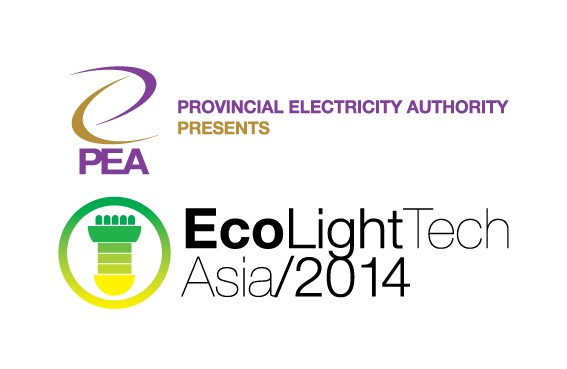
General Information:
Title: PEA presents EcoLightTech Asia 2014
Description: Int’l Tradeshow for Green Technologies & Innovations in Lighting
Dates: Wednesday 12 – Friday 14 November 2014
Venue: Plenary Halls, the Queen Sirikit National Convention Center, Bangkok, Thailand
Target Exhibitors:
- LED manufacturers - LED component manufacturers & distributors
- LED system manufacturers - LED driver & control system manufacturers
- Test & management providers - LED lighting & illumination manufacturers
- Design software suppliers - Lighting equipment & materials suppliers
- Thermal management - Financial Institutions (Green Loans)
- Module & light engine vendors - LED housing manufacturers & suppliers
Suitable for:
- LED lighting manufacturers - Lighting designers, specifiers, & architects
- Interior designers - LED product designer
- LED makers & distributors - Energy-efficient organizations
- Corporate R&D staff - Government regulators & policy makers
- Financial analysis - Investment bankers & venture capitalists
- LED & lighting specialists in mobile appliances, signs & displays, automotive lightings, signals, illuminations, electric equipment
Special space rental:
Raw space; USD 225/sqm.
Shell scheme; above price + USD 20/sqm.
For more information and service:
N.C.C. Exhibition Organizer Co., Ltd. (NEO)
Project Management Team 5:
Tel: +66 2 203-4260-62 Fax: +66 2 203-4250-1
E-mail: ecolight@Qsncc.com URL: www.ecolighttech.com
LED technology is pushed by governments around the world
Japan: Will strictly forbid the use of incandescent lights starting 2012
Korea: Will forbid the use of incandescent lights starting 2013
Thailand: Has been encouraging the replacement since 2007
Canada: Its government will forbid selling incandescents starting 2012
Switzerland: Has forbidden selling type F & G light bulbs with low luminous efficacies included a few kinds of incandescent lights since 2007
UK: Has forbidden the use of incandescent lights since 2011
India: Plans to replace 400 million incandescent light bulbs with energy- saving lights by end of 2012
Australia: Has implemented strict policies on importing and selling incandescent lights since 2008
Malaysia: Will forbid manufacturing incandescent light bulbs with energy-saving lights at end of 2014
Ireland: Has forbidden selling incandescent lights with low luminous efficacies since 2009
China: Will forbid selling and importing incandescents with luminous efficacies of 100W and higher, 60W and higher, 15W and higher starting from end of 2012, end of 2014, and end of 2016 respectively
Philippines: Has begun advocacy of forbidding incandescents in households and other infrastructures since 2010
EU: Has started forbidding the use of 100W incandescent lights since 2009 and started forbidding the use of 65W since 2010, and has forbidden selling 60W incandescent light bulbs since September 2011. It will forbid selling 40W and 25W from September 2012 onwards and only light bulbs with luminous efficacies higher than that of type D light bulbs are allowed to be sold in the EU. EU also plans to fully replace incandescent light bulbs by 2015 and only light bulbs with luminous efficacies higher than that of type B light bulb are allowed to be sold by 2016
USA: United States’ government will completely replace incandescent lights from 2012 to 2014
Supportive government policies in Thailand
The Thai government, along with other countries, is crusading for greener lighting technologies. According to the “20-Year Energy Efficiency Development Plan, (2011-2030)” a report released by Thailand’s Ministry of Energy, the Thai government plans to reduce energy intensity by 25% in 2030, compared with that in 2005, or equivalent to reduction of final energy consumption by 20% in 2030. Implementation in pursuance of this will result in cumulative energy savings at an average of 14,500 ktoe/year, which is worth THB272 billion per year, and cumulative CO2 emission reductions at an average of 49 million tons/year.
Major mandatory measures include the enforcement of the Energy Conservation Promotion Act, B.E. 2535 (1992), as amended up to No. 2, B.E. 2550 (2007), the establishment of Minimum Energy Performance Standards (MEPS), and energy efficiency labeling. As for supportive and promotional measures, a major one will be the Standard Offer Program (SOP), or funding for the amount of energy saving achieved.
Emphasis on measures which bring about market transformation and energy consumers’ behavioral change are in place such as enforcing energy efficiency labeling for equipments, appliances, buildings and vehicles so as to provide options for consumers. Large-scale energy businesses, like those in the electricity, oil and natural gas industry, have been required to implement energy conservation promotion measures to encourage their customers to reduce energy use by a specified minimum standard (Energy Efficiency Resource Standards: EERS), instead of allowing such measures to be voluntarily undertaken as previously practiced. Assistance measures, both financial and technical, will be provided for small operators like SMEs, particularly the provision of funding via the Standard Offer Program (SOP) and technical assistance via EERS.
The Thai government plans to reduce energy intensity by 25% in 2030, compared with that in 2005, or equivalent to reduction of final energy consumption by 20% in 2030.
As for the promotion of the event, the Thailand Convention and Exhibitions Bureau (TCEB) further emphasizes the image of Thailand as the exhibition hub of the region, which in turn will create business opportunities that can lead to investment and trade in ASEAN plus 6, with a combined trade value of USD6.4 billion, which is a quarter of the total global trade and the accessibility to more than half of the world’s population.












